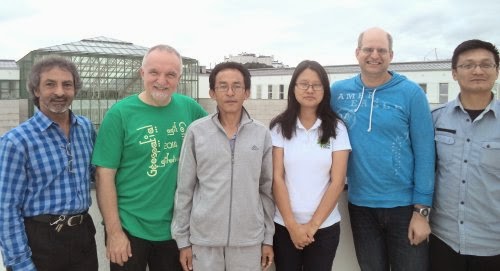 In the course of armed conflicts in South Sudan more than 1.1 million people have been internally displaced since December 2013. In the frame of a cooperation with Médecins Sans Frontières (MSF) Z_GIS is monitoring one of the many camps for internally displaced persons (IDP), which have been established since. The department acquired four WorldView-2 images for the IDP camp Minkaman, Awerial county, Lakes State, between December 2013 and June 2014. The number of extracted dwellings increased from around 2,000 in December to nearly 14,000 in June.
In the course of armed conflicts in South Sudan more than 1.1 million people have been internally displaced since December 2013. In the frame of a cooperation with Médecins Sans Frontières (MSF) Z_GIS is monitoring one of the many camps for internally displaced persons (IDP), which have been established since. The department acquired four WorldView-2 images for the IDP camp Minkaman, Awerial county, Lakes State, between December 2013 and June 2014. The number of extracted dwellings increased from around 2,000 in December to nearly 14,000 in June.Besides information on single dwellings, dwelling density, camp structure and camp growth analyses were provided to MSF. This information helps MSF in the mission planning to calculate the need for water, food, medication and staff. The regular monitoring of population movements is especially crucial due to the outbreak of Hepatitis E within the camp. Further updates are planned for end of July and end of August. Since beginning of this year, the population estimation service has been also requested for a second IDP camp in South Sudan, a refugee camp in Kenya and a rural settlement in the Democratic Republic of the Congo (DRC). The service groundwater exploration, which provides potential groundwater borehole sites based on EO data and ancillary information (geological maps, hydrogeological maps etc.), was applied for a refugee camp in Ethiopia, hosting refugees from South Sudan. MSF also requested information regarding land cover for a rural area in DRC in the frame of a malaria project. Z_GIS produced a total of 40 maps for MSF so far this year. The activities are carried out within the project EO-based information services in support of humanitarian operations, funded by the Karl Kahane Foundation. The services are further improved within the EO4HumEn project, funded by the Austrian Research Promotion Agency (FFG).








